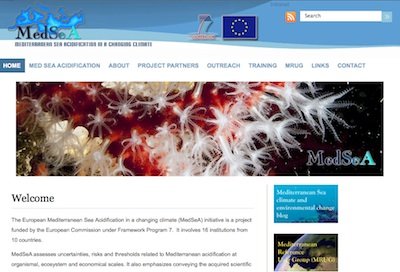In recent years the issue of ocean acidification has moved rapidly up the political, economic and social agendas and is especially pertinent when combined with other pressures upon the marine environment, such as increased temperature, overfishing, invasive species and deoxygenation. The Mediterranean Sea is of special interest to ocean acidification research as it is a complex, semi-enclosed body of water with high environmental variability and natural CO2 vents.
To discuss and share knowledge about ocean acidification and climate change impacts on this dynamic marine environment, over 60 scientists from 12 countries, mainly from the Mediterranean region, will meet in Rome on 5th and 6th March 2012 for the first Annual Science Meeting of the EU-funded Mediterranean Sea Acidification in a Changing Climate (MedSeA) project. The meeting will discuss the results from the project’s first year of research and will enable scientists to plan future areas of work. It will also be the first step in assessing uncertainties, risks and thresholds related to Mediterranean acidification at organismal, ecosystem and economical scales.
Ocean acidification is the term used to describe the ongoing decrease in ocean pH caused by human CO2 emissions, such as the burning of fossil fuels and cement production. This is the first concerted effort to study the impact of acidification and climate change on the Mediterranean ecosystems, which is fundamental to the social and economic conditions of the many millions of people living along its coastlines and visiting the region each year.
In the framework of the MedSeA project, the Mediterranean Reference User Group (MRUG) will meet on the 7th March. The MRUG aims to facilitate the communication of the research findings on ocean acidification and its effects to the larger Mediterranean society, in particular to policy makers and industry representatives. At this meeting, MRUG members will meet to be updated on the project research outputs and its implications to environment and society in the region, to develop their action plan to help disseminate science results and policy-related information to relevant organisations and stakeholders, and to share information and practices with relevant, external actors and stakeholders.
About the MedSeA project
The European Mediterranean Sea Acidification in a changing climate (MedSeA) initiative is a project funded by the European Commission under 7th Framework Programme. It involves 16 institutions from 10 countries, led by the Institute of Environmental Science and Technology of the Autonomous University of Barcelona (UAB).
MedSeA assesses uncertainties, risks and thresholds related to Mediterranean acidification at organismal, ecosystem and economical scales. It also emphasizes conveying the acquired scientific knowledge to a wider audience of reference users, while suggesting policy measures for adaptation and mitigation that will vary from one region to another.
For full information, please visit http://medsea-project.eu/
Project coordinator: Patrizia Ziveri ([email protected])
Project manager: Rahiman Abdullah ([email protected])
Press contact UAB, Spain: Ms. Anna Ripoll ([email protected])
Press contact PML, UK: Kelly-Marie Davidson ([email protected])
Press contact CMCC, Italy: Mauro Buonocore (CMCC, [email protected])
MRUG chair: Bernard Avril ([email protected])
Local organizer (CONISMA): Antonio Mazzola, Marco Milazzo ([email protected]) and Edoardo Papa




